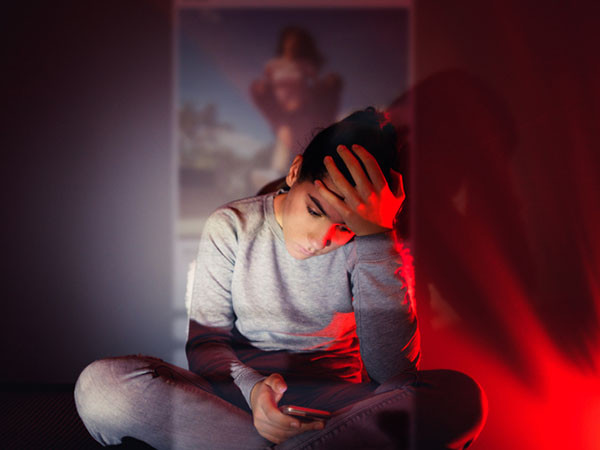A conversation about reducing the harms of social media

Editor's note: In this blog post, Dr. Sharon Levy interviews her son Isaiah Levy, a college student. We appreciate Isaiah's insights and comments on social media's impact on teens and young adults.
It is hard to remember (or for younger people, hard to imagine) a world without social media, but indeed such a world once existed — and in fact, it is the world humans evolved in.
Humans are social animals. Friendly interactions release dopamine in our brains' reward centers to get us to repeat the behavior. Until recently, that feedback loop suited us very well, with little opportunity to get off track. Social media changed things by providing the opportunity for nearly infinite interactions. This excess exploits our natural inclination for social contact in the same way that sweets exploit our natural drive to eat ripe fruit. Too much refined sugar can cause a cascade of medical problems; too much social media can also affect health — especially mental health.
Beyond sheer volume, social media interactions are qualitatively different from in-person meetings. For one thing, social media platforms have developed easy opportunities for viewers to react to content, resulting in objective feedback metrics for the content creator. Because the denominator is essentially infinite, no matter how many likes a post gets, the numerator may not feel like enough. Feeling insufficient, not liked enough, judged by others, or excluded from an "in group" takes a heavy toll on mental health.
For perspective from a digital native, I posed questions about social media to my son Isaiah Levy, a computer science major at New York University.
What do you see as the benefits of social media?
Theoretically, social media can connect people across the globe at scale, presenting an opportunity for users to form relationships beyond their geographic boundaries. Popular social media platforms can also provide a stage with a potential audience of one billion eyes. Social media offers tremendous potential for people who want to be noticed.However, most connections are extensions of our real-life relationships, and many users say that social media enriches friendships. For example, a Pew survey found that a majority of teenage respondents said that Instagram enhanced their connections with people they already knew (many of whom are classmates).
Why is Instagram so popular with young people?
Web developers and graphic designers created Instagram using sophisticated algorithms and attractive visual presentation, to keep users engaged and interacting with its nearly limitless content for as long as possible. According to surveys done by Facebook (owner of Instagram), youth describe Instagram as current, friendly, trendy, and creative. Many teens say that Instagram helps define who they are and makes them feel more connected to the people they know. Another significant source of Instagram's allure, particularly for younger users, are the objective feedback measures that can make users feel important or of high social status.
The flip side is that the drive for attention creates its own problems. The Pew survey linked to above found that more than one-third of teen Instagram users said they feel pressure to post content that will get a lot of likes and comments, and more than 40% feel pressure to only post content that makes them look good. According to Facebook's own internal surveys, more than 13% of teen girls said that Instagram worsens suicidal thoughts, and 17% said their eating disorders got worse with Instagram use.
As the government considers regulating social media, what suggestions do you have in regard to protecting mental health?
Government regulations should protect our freedom of expression while mediating risks, especially to children. The government could consider regulating some of the advanced algorithms that social media corporations use to increase user time expenditure (and thus profits). For example, "infinite swiping" is a design feature that continuously pushes forward new content after a user has exhausted content from the people they follow. These tactics pose serious threats. Just like use of alcohol, nicotine, or drugs, the act of swiping triggers neurological reward. Over time, the brain learns to seek social media instead of more natural rewards, putting users at risk of dissociation with meaningful priorities. As with drug addiction, younger users are at greatest risk. Government regulation of the most sticky algorithms would help promote a healthier balance for users. Deciding which algorithms to ban and how to implement such a ban is certainly a difficult task, and the solution will not be perfect; however, given what we know of the impact of social media on children's mental health, it should be a federal priority.
While the government grapples with regulation, parents can step in. First, set a good example by putting your own screens down when interacting with your children. Talk to your teen about the pros and cons of social media: while it can be fun, it can also become a distraction. Set limits on your child's social media use. Most importantly, talk to your children about their experiences, including who they are interacting with and what they are talking about. We know social media can harm mental health, so be on the lookout and intervene if you have concerns.
About the Author

Sharon Levy, MD, MPH, Contributor
Disclaimer:
As a service to our readers, Harvard Health Publishing provides access to our library of archived content. Please note the date of last review or update on all articles.
No content on this site, regardless of date, should ever be used as a substitute for direct medical advice from your doctor or other qualified clinician.















